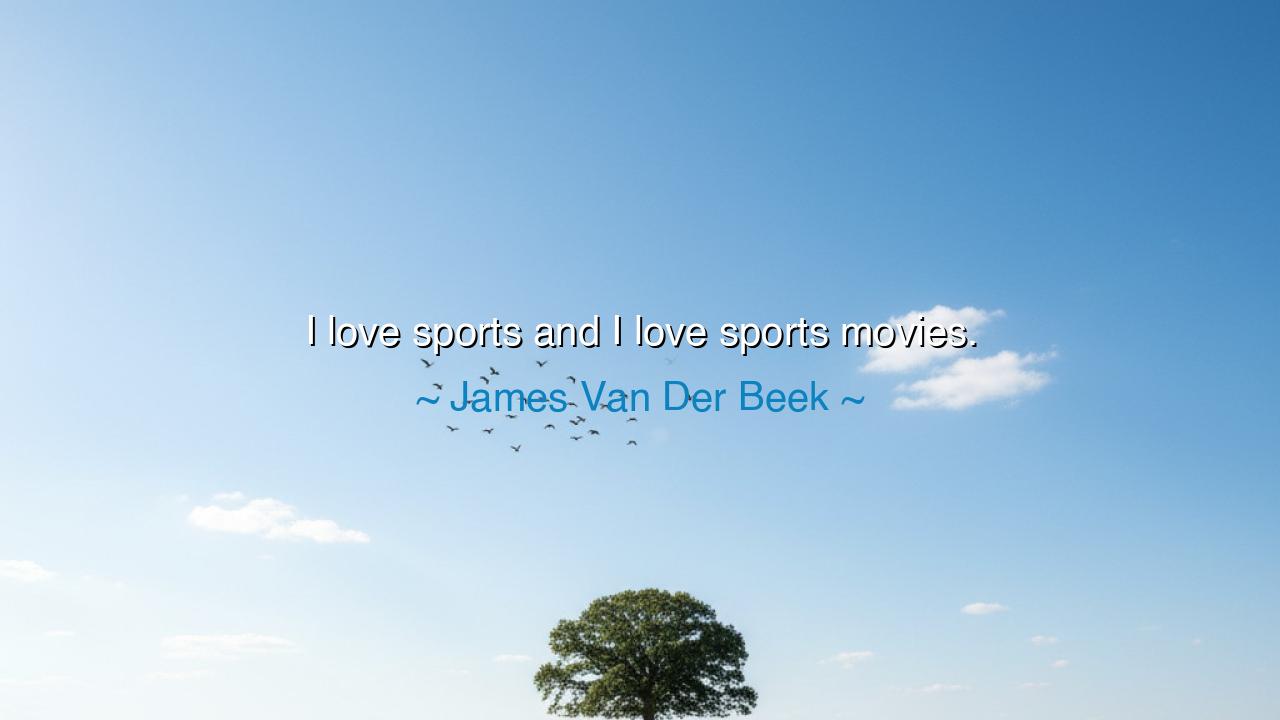
I love sports and I love sports movies.






"I love sports and I love sports movies." With these simple yet powerful words, James Van Der Beek reveals the profound connection between two aspects of human experience: the pursuit of victory through physical prowess and the immortalization of that struggle through the art of storytelling. Sports are, at their core, a reflection of the human condition—filled with struggle, sacrifice, glory, and defeat. And sports movies, much like the ancient epics, capture the essence of these moments, elevating them to something more universal, more enduring. They are stories not just about winning or losing, but about the journey—the courage, the resilience, and the spirit that defines what it means to be human.
In the ancient world, sports were not just physical contests, but rituals that connected men to the gods and to the very fabric of life. The ancient Greeks, with their Olympic Games, celebrated athletic excellence as a tribute to the gods, particularly Zeus, the ruler of the heavens. To compete in the Olympics was to strive not just for personal glory, but to align oneself with the divine order, to embody the virtues of discipline, strength, and endurance. Sports, then, were more than mere contests—they were expressions of human potential, much as Van Der Beek celebrates them today, both as an activity and as an art form captured on screen.
Consider the Iliad by Homer, where the great Achilles faces not only the external forces of war but the internal struggle of pride and rage. Though a warrior on the battlefield, his true battle is with his own emotions, his own sense of honor and fate. The story of Achilles is not unlike the sports movies we cherish today, where the battle is as much internal as it is external. The physical contest of sports is often a metaphor for the greater fight we all face in life—against our own doubts, fears, and limitations. Just as Achilles rises to greatness on the battlefield, the heroes in sports films rise to greatness not by winning the game, but by overcoming the struggles that define them.
In much the same way, consider the Romans, who celebrated Gladiatorial Games as both spectacle and ritual. The gladiators, though forced into brutal combat, often became symbols of resilience and honor. While their battles were real, their story was told and retold through the grand arenas of Rome. The heroes of these games became legends not just for their physical strength, but for their ability to overcome the impossible. Similarly, the heroes of sports movies become symbols of what it means to fight, to rise above, and to transcend the limitations placed upon them. Their journey is not just about the victory, but the strength of character they develop through the struggle.
The connection between sports and sports movies is rooted in the narrative arc they share. Every sports movie, from the triumph of Rocky to the team spirit of Remember the Titans, follows a familiar path of struggle, growth, and redemption. These stories, though fictionalized, mirror the real-life drama that plays out on the field. Consider the story of Muhammad Ali, who not only faced opponents in the boxing ring but fought against societal expectations and racial injustice. His battles outside the ring were just as pivotal as those inside it. His resilience, his ability to overcome adversity, became the stuff of legend, much like the characters in the sports movies we revere. Ali’s story, much like those of other athletes, is not just about winning a match—it is about facing the odds, embracing the journey, and overcoming oneself.
Van Der Beek’s love for both sports and sports movies calls us to reflect on the importance of storytelling in shaping our understanding of life. Sports movies elevate ordinary people to the status of heroes, showing us that greatness is not always born from perfection but from perseverance. They inspire us to continue the fight, to rise after every fall, and to understand that victory is not always in the trophy, but in the journey itself. This is the true lesson of sports: that life itself is a contest, one where we are continually challenged, but where the greatest victory comes not in defeating others, but in mastering ourselves.
The lesson to be drawn here is clear: embrace the struggle. In life, as in sports, the most profound growth comes not from the easy victories but from the challenges we face along the way. Like the athletes in sports movies, we must learn to embrace setbacks as opportunities for growth, to see every defeat not as an end but as a lesson. Whether you are playing a game, pursuing a career, or facing personal challenges, the key is to persevere, to rise above, and to see the struggle itself as the path to greater strength and understanding.
In practical terms, this means that when you face obstacles, whether in your personal life or your work, do not shy away from them. Embrace them as part of your journey, knowing that every challenge, like the heroes of sports movies, will shape you into something greater. Push forward, learn from your failures, and find joy not just in the victory, but in the effort. Just as Van Der Beek celebrates sports and the stories they inspire, so too should we honor the journey, for it is in the struggle that we find our true strength.






AAdministratorAdministrator
Welcome, honored guests. Please leave a comment, we will respond soon